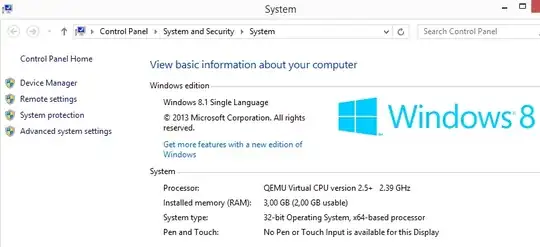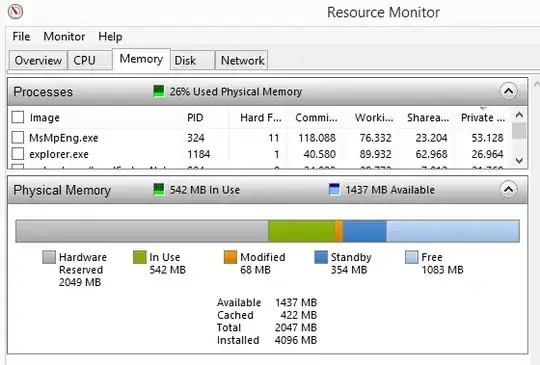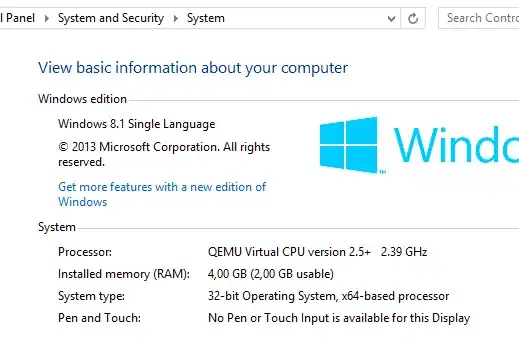I've got a Debian 10 KVM hypervisor, no libvirt or other tool to administrate it, using QEMU scripts. I need a 32bit Windows VM for a legacy app, but on a supported OS (not XP), either Windows 8.1 or 10 32bit. Both Windows 8.1 & 10 present a message «2GB usable» on system properties when 3GB RAM is assigned (the max capable of handling for a 32 bit machine without other techniques I suppose). On the contrary Win XP seems to use 3GB RAM, stating PAE enabled.
Any ideas how to use 3GB RAM on Win 8.1 or 10, 32 bit?
Here's the screenshot of Win 8.1 VM with 3GB RAM (some on Win 10):

Here is the QEMU script to start the VM (I've also tried host CPU, no difference):
#!/bin/sh
SPICE_PORT=3010
MONITOR_PORT=2330
QEMU_AUDIO_DRV=alsa
kvm \
-M q35 \
-nodefaults \
-cpu qemu64 \
`# -cpu host` \
-m 3G \
-mem-path /dev/hugepages \
-device virtio-balloon-pci \
-rtc base=localtime \
-vga qxl \
-drive file=win8.qcow2,if=virtio,cache-size=16M,cache=writethrough \
-device virtio-net-pci,netdev=diktyo0 \
-netdev user,id=diktyo0 \
-monitor telnet:localhost:${MONITOR_PORT},server,nowait \
-device virtio-serial \
-device virtserialport,chardev=vdagent,name=com.redhat.spice.0 \
-chardev spicevmc,id=vdagent,debug=0,name=vdagent \
-spice port=${SPICE_PORT},addr=127.0.0.1,disable-ticketing \
-device virtserialport,chardev=charchannel1,id=channel1,name=org.spice-space.webdav.0 \
-chardev spiceport,name=org.spice-space.webdav.0,id=charchannel1 \
-soundhw ac97 \
-name "Windows 8.1 x86" \
-daemonize \
Following shodanshok's advice, I post resource monitor's output (with 4GB total RAM):

Half the memory is reserved by hardware.
I've also increased RAM to 4GB:

Just in case of QXL video driver reserving too much memory, I also changed the line configuring video to:
-device qxl-vga,vgamem_mb=64,ram_size_mb=64,vram_size_mb=64
I may try to change the Seabios, at least the version. Unfortunately in Debian Stable QEMU version is 3.1.0; it's quite old, I wonder if the same behaviour appears in newer versions.